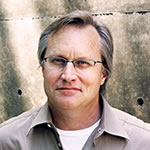
Stan Cowan is the managing principal of Dallas-based landscape architecture firm MESA.
On the Great Plains of the Texas panhandle, Stan Cowan grew up on a vast ranch built by his great-grandfather and generations thereafter outside the sparsely populated town of Miami (pronounced my-AM-uh) in Roberts County, a community that he says his family members helped shape. Today, Cowan is the managing principal of Dallas-based landscape architecture firm MESA.
Cowan’s two grandfathers were particularly influential. They understood the effects of soil conservation and prairie range management while taking advantage of the advancements of modern agriculture. “They were very aware of the land and how to support it,” Cowan says. “It was these kinds of ideas that gave me an understanding of the impact on the environment from a young age.”
This upbringing laid a foundation that has shaped Cowan’s approach to land stewardship, and as a result, he actively seeks to understand the heritage of a place and any sustainable opportunities early in the planning and design process. This approach, integrated into every aspect of MESA’s projects—whether large or small, public or private—has allowed Cowan to respond to urban and suburban developments that tend to swallow an area’s natural landscape and erase its ecological features.
Since joining MESA as an intern after graduating from Kansas State University in the late 1980s, Cowan has increasingly devoted himself to large-scale master-planned communities such as Canyon Falls, a 1,200-acre master-planned community in North Texas that is currently in development. Cowan attempted to tell the story of the land by incorporating naturally occurring materials and features.
Combining nature, culture, and design is a thread that weaves throughout MESA’s portfolio of projects. From master-planned communities to small-scale residential sites such as the Turtle Creek Pump House, MESA delivers a sense of place that is tied to the area’s culture. The Pump House project, which transformed a pump station in Dallas into an art gallery and studio flat, preserves and recycles an entire site rather than just site materials. In a city where new is typically seen as better, the Pump House is a reminder that the bones of history can provide form for repurposing new spaces.

Once a water pump station, the Turtle Creek Pump House in Dallas today is an art gallery and studio flat with native landscaping and several water features. Photo: Tom Jenkins

The Pump House is a reminder that historical structures provide opportunities for reuse. Photo: Tom Jenkins
Cowan is passionate about finding innovative ways to educate clients and those who visit the park environments MESA creates. For Arbor Hills and the Dogwood Canyon Audubon Center, the team examined wildlife habitats and the existing flora, then created interpretive trails and experiential zones that encourage appreciation of plants and wildlife in their natural settings. Along with managing stormwater and establishing wildlife corridors, MESA also explores responsible maintenance practices and works to change “the mindsets of public and private clients—how not to maintain and mow everything,” says Cowan, who also encourages prairie-enhancing controlled burns and the removal of invasive vegetation.

Cowan specializes in large-scale master-planned communities such as Canyon Falls, a 1,200-acre master-planned community in North Texas that is currently in development.

Canyon Falls’ site plan. Cowan attempted to tell the story of the land by incorporating naturally occurring materials and features.
Part of MESA’s success has been Cowan’s commitment to maintaining a diversity of market sectors and clients, which helps prepare the firm for potential dips in economy. This has included international offices, with former MESA locations in Madrid, followed by Dubai and Abu Dhabi. “We learned a lot from our experiences in the Middle East,” Cowan says, “We implemented our sustainable approach from the US into our international projects and brought back new strategies for water conservation and knowledge of adaptive species.”
MESA is currently expanding the use of environmentally sound land management to other market segments such as healthcare and senior-living centers. The T. Boone Pickens Hospice and Palliative Care Center, for instance, is the first of its kind in the United States. MESA is using existing landforms to create a lakefront hillside garden terrace with courtyards to accommodate for private, semi-private, and public areas, which offer a variety of opportunities for patients, family members, and staff to find respite.
Cowan believes in maintaining an intellectual curiosity around his and the firm’s design work. “We continually ask ourselves, ‘Are we giving the greatest value to the client and community?’” he says. By “value,” he not only means an economic one, but also a legacy for future generations that will keep them connected to the land, just like Cowan’s own family.

